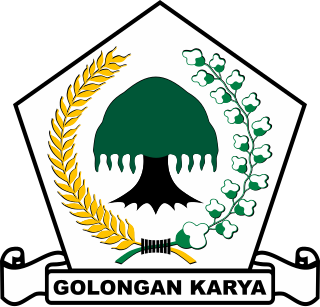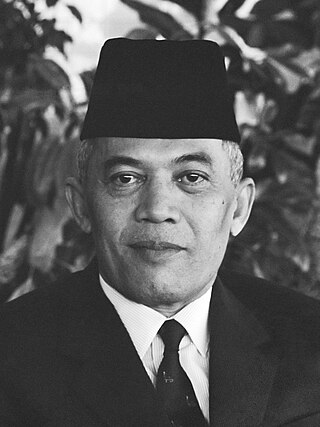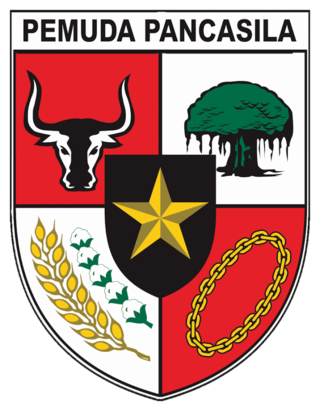Related Research Articles

The Party of Functional Groups, often known by its abbreviation Golkar, is a centre-right big tent political party in Indonesia. Founded in 1964 as the Joint Secretariat of Functional Groups, it is the oldest extant political party in Indonesia. It first participated in national elections in 1971 as Functional Groups. Since 2009, it has been the second-largest party in the House of Representatives (DPR), having won 102 seats in the latest election.

The United Development Party is an Islam-based political party in Indonesia.

Susilo Bambang Yudhoyono, commonly referred to as SBY, is an Indonesian politician, painter and retired army general who served as the sixth president of Indonesia from 2004 to 2014 and the second president of Indonesia from the military after Suharto. He founded the Democratic Party of Indonesia, he served as the 4th leader of the Democratic Party from 2014 until 2020, 8th and 10th Coordinating Minister of Politics and Security Affairs of Indonesia from 2000 until 2001, and again from 2001 until 2004. He also served as the president of the Assembly and chair of the Council of the Global Green Growth Institute. He was also the former chairman of ASEAN due to Indonesia's hosting of the 18th and 19th ASEAN Summits.

Abdul Haris Nasution was a high-ranking Indonesian general and politician. He served in the military during the Indonesian National Revolution and he remained in the military during the subsequent turmoil of the Parliamentary democracy and Guided Democracy. Following the fall of President Sukarno from power, he became the Speaker of the People's Consultative Assembly under President Suharto. Born into a Batak Muslim family, in the village of Hutapungkut, Dutch East Indies, he studied teaching and enrolled at a military academy in Bandung.

Sudharmono, also known by his nickname, Pak Dar, was an Indonesian Army officer and politician, who served as the fifth vice president of Indonesia from 1988 until 1993 under the New Order regime. Previously, he served in several positions in the government and military, including as the Chairman of Golkar, State Secretary of Indonesia, and a Lieutenant General in the army.

The New Order describes the regime of the second Indonesian President Suharto from his rise to power in 1966 until his resignation in 1998. Suharto coined the term upon his accession and used it to contrast his presidency with that of his predecessor Sukarno.

The People's Consultative Assembly of the Republic of Indonesia is the legislative branch in Indonesia's political system. It is composed of the members of a lower body, House of Representatives (DPR) and an upper body, Regional Representative Council (DPD). Before 2004, and the amendments to the 1945 Constitution, the MPR was the highest governing body in Indonesia.

The 1945 State Constitution of the Republic of Indonesia is the supreme law and basis for all laws of Indonesia.

Ali Sadikin was an Indonesian politician who served as the fourth governor of Jakarta from 1966 until 1977. Prior to becoming governor, he served as Minister of Transportation from 1963 until 1966 and Coordinating Minister for Marine Affairs from 1964 until 1966. He also served as Chairman of the Football Association of Indonesia from 1977 until 1981. Born to parents of ethnic-Sundanese descent, Ali attended the Semarang Shipping Science Polytechnic during the Japanese occupation period. During the Indonesian National Revolution, he joined the People's Security Agency Navy, the predecessor to the Indonesian Navy, and fought against the Dutch during Operation Product and Operation Kraai. Following the end of the national revolution, Ali remained in the navy and fought against the Permesta rebel movement in the late 1950s.

The president of the Republic of Indonesia is the head of state and head of government of the Republic of Indonesia. The president is the leader of the executive branch of the Indonesian government and the supreme commander of the Indonesian National Armed Forces and the Indonesian National Police. Since 2004, the president and vice president have been directly elected to a five-year term, once renewable, allowing for a maximum of 10 years in office. The new president of Indonesia is Prabowo Subianto, who assumed office on 20 October 2024.

The Seventh Development Cabinet was the Indonesian cabinet which served under President Suharto and Vice President B. J. Habibie from 16 March 1998 to 21 May 1998.

The Sixth Development Cabinet was the Indonesian cabinet which served under President Suharto and Vice President Try Sutrisno from March 1993 until March 1998. The Cabinet was formed after Suharto was elected to a 6th term as President by the People's Consultative Assembly (MPR).

The acting presidency of Suharto followed the transition to the New Order in which Army General Suharto assumed presidential powers to "restore" law and order following the now-disputed attempted coup which led to anti-communist purges. The term lasted from 12 March 1967 until 27 March 1968, when Suharto was officially inaugurated as the definitive President of Indonesia.

Legislative elections were held in Indonesia on 3 July 1971, the first under the New Order regime. There were ten participants; nine political parties and the "functional group" Golkar, which came first with more than 60 percent of the vote, resulting in an absolute majority in the People's Representative Council.

Legislative elections were held in Indonesia on 2 May 1977. They were the third legislative elections since independence, and the second under the New Order regime. There were three participants; the two political parties and functional group Golkar.
Dwifungsi was a political doctrine implemented by Suharto's military-dominated New Order government in Indonesia following the removal of President Sukarno. Dwifungsi was used to justify the ABRI—especially the Indonesian Army—permanently increasing its influence in the Indonesian government, including reserved military-only seats in the parliament, and top positions in the nation's public service.
The Operational Command for the Restoration of Security and Order, or Kopkamtib, was a military body established to deal with the 1965 coup attempt operation in Indonesia, and was subsequently used by President Suharto's New Order regime to suppress dissent.

The Pancasila Youth is an Indonesian far-right paramilitary organization established in 1959. The organisation's name refers to Pancasila, the official "five principles" of the Indonesian state. Pemuda Pancasila was involved in the Indonesian mass killings of 1965–66, and supported the New Order regime of President Suharto. Its members extort money, control car parking and offer security services.

Pancasila is the official, foundational philosophical theory of Indonesia. The name is made from two words originally derived from Sanskrit: "pañca" ("five") and "śīla".

The Indonesian Democratic Union Party,, was a political party founded by Sri Bintang Pamungkas in 1995 and one of the political parties in Indonesia that participated in the 1999 general elections.
References
- Bakri Tianlean (1997) A.H. Nasution di Massa Order Baru (A.H. Nasution during the New Order), Mizan Pustaka, Bandung ISBN 979-433-138-4
- P. Bambang Siswoyo (1983) Sekitar Petisi 50 61 360 (About the Petitions of 50, 61 & 360) CV. Mayasari, Solo (no ISBN)
- Crouch, Harold (2007) The Army and Politics in Indonesia, Equinox, Jakarta ISBN 979-3780-50-9
- Ricklefs, M.C. (1991). A History of Modern Indonesia since c.1300, 2nd Edition. London: MacMillan. ISBN 0-333-57689-6.
- Schwarz, A. (1994). A Nation in Waiting: Indonesia in the 1990s. Westview Press. ISBN 1-86373-635-2.